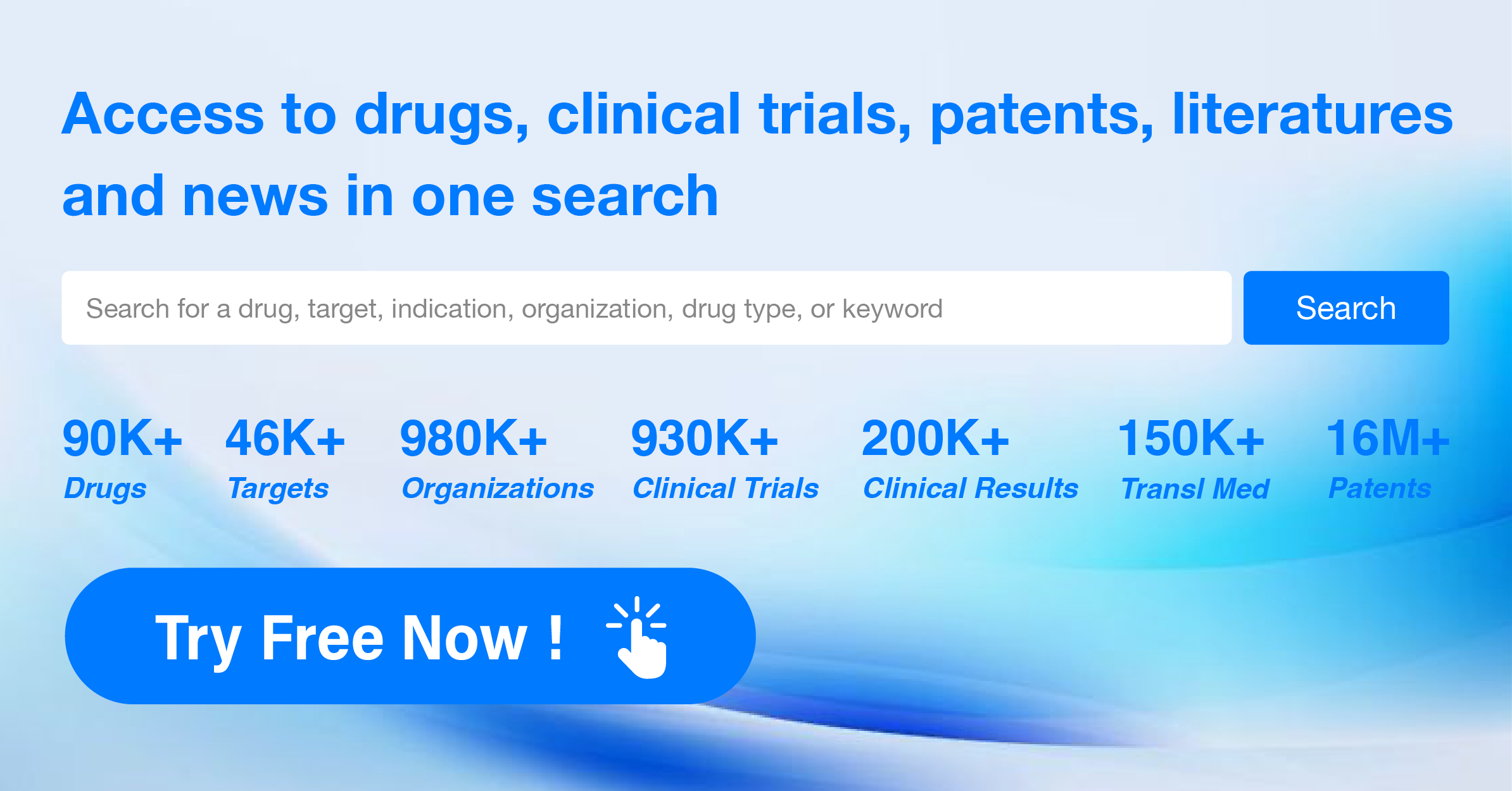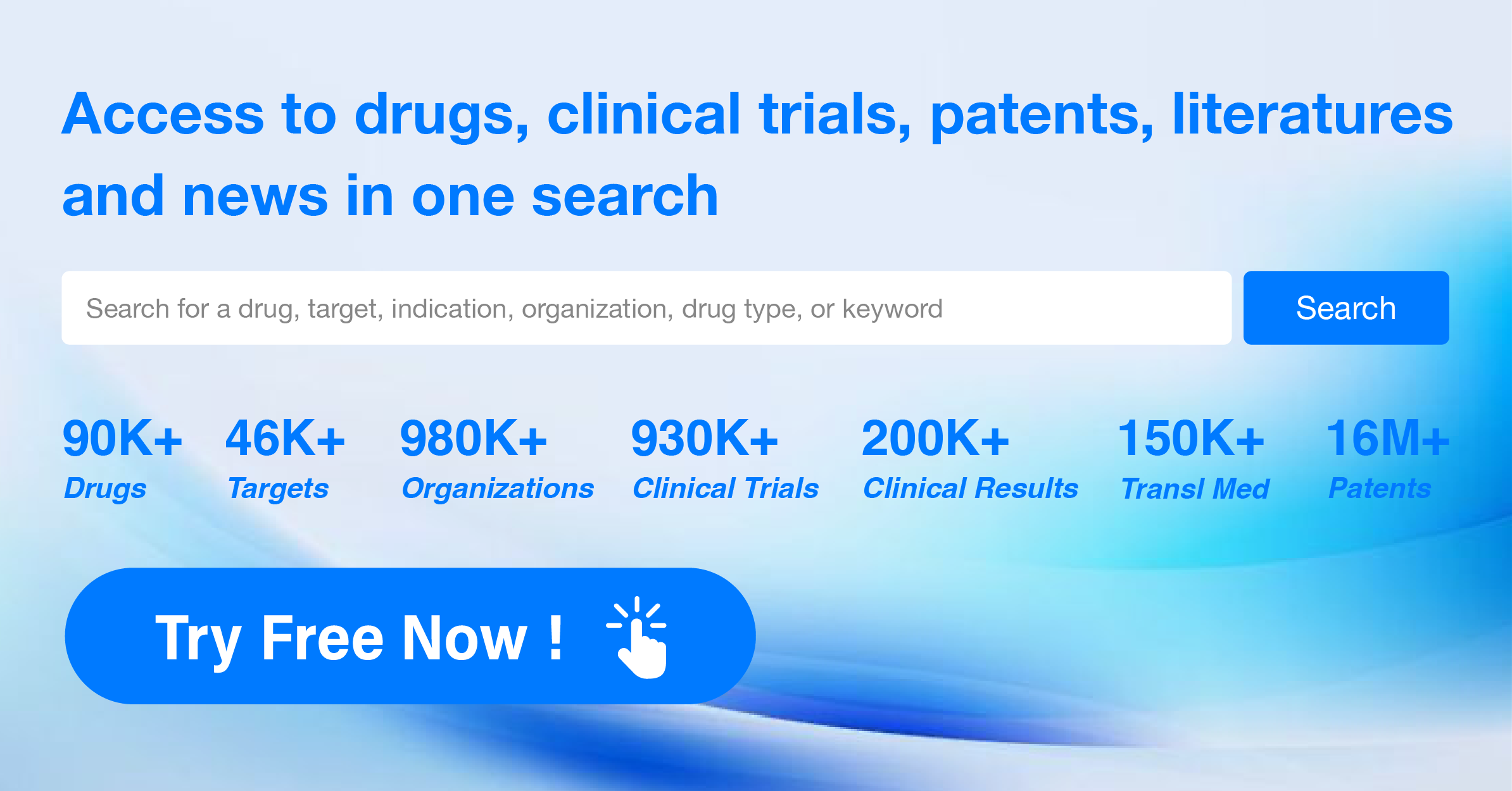Global New Drug Research and Development Progress Weekly Report(6.17-6.23)
Global Pharmaceutical Research and Development Progress
1.AstraZeneca's durvalumab (Imfinzi) approved for new indication as a first-line combination therapy for endometrial cancer!
On June 17th, according to the official AstraZeneca website, durvalumab received FDA approval for a new indication in combination with carboplatin and paclitaxel, followed by sole use of durvalumab as treatment for adults with primary advanced or recurrent endometrial cancer characterized by deficient mismatch repair (dMMR). The approval of this indication is based on the results from the Phase III clinical trial DUO-E.
The DUO-E study (GOG 3041/ENGOT-EN10) is a randomized, double-blind, placebo-controlled, multinational Phase III clinical trial aimed at evaluating the efficacy and safety of first-line treatment with carboplatin and paclitaxel combined with Imfinzi, followed by maintenance therapy with Imfinzi ± olaparib in patients with newly diagnosed advanced or recurrent endometrial cancer. The primary endpoint was progression-free survival (PFS) compared to the standard therapy. The trial results demonstrated that although there was a statistically significant improvement in PFS with Imfinzi combined with carboplatin and paclitaxel over carboplatin and paclitaxel alone in the overall population, this improvement was primarily attributed to patients harboring dMMR tumors.
2.HUTCHMED's Syk inhibitor, Suletinib (HMPL-523), phase III clinical data in China published in a Lancet journal
On June 17, HUTCHMED announced that the ESLIM-01 Phase 3 study results of the Syk inhibitor Suletinib (HMPL-523) for adult patients with primary immune thrombocytopenia (ITP) in China have been published in The Lancet Haematology. Additionally, further details and subgroup results of this study were recently presented at the European Hematology Association (EHA) 2024 Annual Meeting through one oral presentation and two poster displays. Notably, the China National Medical Products Administration (NMPA) has accepted the marketing application for Suletinib for adult patients with primary immune thrombocytopenia and has included it in the priority review process. Suletinib is a novel, highly selective oral inhibitor of spleen tyrosine kinase (Syk), designed for the treatment of hematologic malignancies and immune diseases. The ESLIM-01 study is a randomized, double-blind, 2:1 Phase 3 clinical trial conducted in China among 188 adult patients with primary immune thrombocytopenia who had previously received at least one standard line of treatment. The results indicate that Suletinib provides a clinically meaningful, rapid, and sustained response in platelet counts, with a tolerable safety profile and improved patient quality of life.
3.Kangzhe Pharmaceutical has introduced a new drug, Methylene Blue Enteric-Coated Delayed-Release Tablets, which has been approved for marketing in China
On June 18th, the official website of China’s National Medical Products Administration (NMPA) announced that the joint marketing application of the 5.1 new drug methylene blue enteric-coated delayed-release tablets, by Alfasigma, Cosmo Pharmaceuticals and Kangzhe Pharmaceutical, had been approved. According to an earlier press release from Kangzhe Pharmaceutical, this enteric-coated delayed-release tablet is an orally administered diagnostic drug, used to enhance the visualization of colorectal lesions in adult patients undergoing screening or surveillance colonoscopic examination, significantly increasing the detection rate of non-polypoid colorectal lesions. Public information states that methylene blue enteric-coated delayed-release tablets are a novel oral formulation of the existing liquid colorectal dye methylene blue, developed based on innovative technology from Cosmo Pharmaceuticals. The product is used during routine colonoscopies to detect lesions. When taken orally, the tablets deliver the dye in a delayed and controlled manner, distributing it evenly throughout the entire colon. Clinically validated, the product improves the detection of all lesions during endoscopic procedures, including adenomas which are precancerous conditions. An increase in adenoma detection rate is inversely related to the risk of development and mortality from colorectal cancer, hence it has significant clinical importance. Methylene blue enteric-coated delayed-release tablets were approved by the European Medicines Agency (EMA) for marketing in 2020, under the trade name Lumeblue.
4.Kira Pharmaceuticals Presents Long-Term Data on Innovative Dual-Functional C5 Antibody/H Factor Fusion Protein in an Oral Presentation
On June 18th, Kira Pharmaceuticals announced that it presented the long-term safety and efficacy results of the Phase 2 clinical study of KP104 for the treatment of Paroxysmal Nocturnal Hemoglobinuria (PNH) in an oral presentation at the 2024 European Hematology Association (EHA) conference. KP104 is an investigational dual-functional C5 antibody/H factor fusion protein. PNH is a rare and life-threatening blood disorder caused by excessive activation of the complement system, which is a part of the innate immune system. KP104 is a dual-functional complement biologic with a unique mechanism of action. This product is designed to selectively inhibit both the alternative pathway (H factor) and the terminal pathway (C5), offering a synergistic mechanism that may provide a more selective precision treatment for complement-mediated diseases. KP104 has also been engineered to have an extended half-life and potency. Its formulation allows for both intravenous and subcutaneous administration. This year's oral presentation at the EHA meeting covers the long-term results of a Phase 2 clinical study in PNH patients who had not previously been treated with complement inhibitors. Key highlights of the study include treatment outcomes for 18 patients over up to 65 weeks, and continued treatment for 24-26 weeks at the optimized biological dose (OBD) after all patients transitioned from a dose escalation phase involving three cohorts (each cohort n=6).
5.Intra-Cellular's Small Molecule Lumateperone Soon to Submit Regulatory Application
On June 19, Intra-Cellular Therapeutics announced positive top-line results from Phase 3 clinical trial 502 of lumateperone as an adjunctive treatment for depression (MDD). The company anticipates submitting a supplemental New Drug Application (sNDA) to the U.S. FDA for lumateperone as an adjunctive therapy for MDD in the second half of 2024. In study 502, lumateperone taken once daily as an adjunctive treatment for depression achieved its primary endpoint, demonstrating a statistically significant and clinically meaningful reduction in the Montgomery-Åsberg Depression Rating Scale (MADRS) total score at week 6 compared to placebo. Notably, an improvement in the MADRS total score compared to placebo was observed as early as week 1 (p=0.0504), with statistically significant differences emerging in week 2 and maintained throughout the study period. Lumateperone also met key secondary endpoints, showing a statistically significant and clinically meaningful decrease in Clinical Global Impression-Severity (CGI-S) scores compared to placebo at week 6 (p<0.0001), with significant differences from placebo in CGI-S scores starting from week 3 and maintained throughout the study.
6.Case Kaidi's Novel Small Molecule Drug CS060304 for NASH Receives Clinical Trial Approval
On June 19th, China's National Medical Products Administration Center for Drug Evaluation (CDE) published a notice on their official website that Case Kaidi has received implicit permission for clinical trials of their Class 1 new drug, CS060304 tablets, intended for the treatment of Non-Alcoholic Steatohepatitis/Non-Alcoholic Fatty Liver Disease (NASH). Publicly available information reveals that CS060304 is a small molecule agonist targeting the thyroid hormone receptor β (THR-β), which has previously received clinical approval in the United States. According to Case Kaidi’s public information, CS060304 is a novel THR-β agonist developed by the company, highly specific and concentrated in liver tissue. This product has demonstrated positive and significant preclinical data, particularly in improving NAS scores and fibrosis in NASH mouse models, with low effective doses, significant efficacy, and good tolerability. Founded in 2017, Case Kaidi specializes in the fields of metabolic diseases and inflammatory disorders, focusing on the research, development, and commercialization of innovative nuclear receptor drugs. Besides CS060304, the company’s first pipeline product, an FXR agonist CS0159, has been granted Fast Track designation by the FDA for NASH and Orphan Drug designation for Primary Sclerosing Cholangitis, and is currently advancing Phase 2 clinical trials synchronously in China and the USA. Additionally, another of Case Kaidi’s products under development for NASH, CS060380, is currently at the IND (Investigational New Drug) stage.
7.The Phase 1 study of Huadong Medicine's oral GLP-1R agonist HDM1002 shows positive results
On June 20, Huadong Medicine announced positive results from the phase Ia and Ib clinical trials in China of its oral small molecule GLP-1 receptor agonist, HDM1002 tablets. HDM1002, an innovative small molecule drug independently developed by Zhongmeihuadong and holding global intellectual property rights, is a complete agonist of the GLP-1 receptor that is orally active, potent, and highly selective. Preclinical studies have shown that HDM1002 can effectively activate the GLP-1 receptor, induce the production of cyclic adenosine monophosphate (cAMP), and exhibit potent effects in improving glucose tolerance, reducing blood glucose levels, promoting weight loss, and demonstrating good safety profiles. The results from the phase Ia trial indicated that after administration of HDM1002 tablets, postprandial blood glucose levels significantly decreased compared to the placebo, with a dose-dependent response observed. The phase Ib study aimed to evaluate the efficacy and safety of HDM1002 tablets in overweight and obese adult participants, involving 60 patients. Results showed that on day 28, the groups receiving 100 mg or higher doses of HDM1002 tablets experienced a significant reduction in weight compared to the placebo group, also presenting a dose-dependent effect, with average weight reductions of 4.9% to 6.8% within the targeted dose range.
8.Sarepta's First DMD Gene Therapy, Elelysoys, Receives Full FDA Approval!
On June 21, Sarepta Therapeutics announced that the U.S. FDA has approved its gene therapy Elelysoys (delandistrogene moxeparvovec, SRP-9001), co-developed with Roche, for an expanded indication. This includes patients with Duchenne muscular dystrophy (DMD) who are at least 4 years old and have confirmed mutations in the DMD gene. The FDA granted traditional approval for ambulatory patients. For non-ambulatory patients, the FDA granted accelerated approval. Continued approval for non-ambulatory DMD patients is contingent upon results from subsequent confirmatory trials. Elelysoys is contraindicated in patients with deletions in exon 8 and/or exon 9 of the DMD gene. Under the accelerated approval pathway, Sarepta has committed to conducting and submitting results from a randomized controlled trial to verify and confirm the clinical benefits of Elelysoys in non-ambulatory DMD patients. The ENVISION (SRP-9001-303) trial is underway; it is a global, randomized, double-blind, placebo-controlled Phase 3 study targeting non-ambulatory and older ambulatory DMD patients, intended to serve as the confirmatory trial for this post-marketing requirement. Roche entered into a $2.85 billion research and development collaboration with Sarepta in 2019 to co-develop this gene therapy.
9.Zealand Announces Positive Results for Potentially "Best-in-Class" Long-Acting Weight Reduction Therapy, Petrelintide
On June 21st, Zealand Pharma announced top-line results from Part 2 of the Phase 1b multiple ascending dose (MAD) trial of its investigational long-acting and potentially "best-in-class" weight reduction therapy, petrelintide. The analysis indicated that patients treated with high doses of petrelintide for 16 weeks achieved an average weight reduction of 8.6%, compared to only 1.7% in the placebo group. The press release highlighted that these positive results support the use of petrelintide as an alternative option for weight management beyond the GLP-1 receptor agonist class of drugs. Zealand expects to initiate a Phase 2b clinical trial in the second half of 2024. The Part 2 of the Phase 1b MAD trial included 48 participants (approximately 80% male), with a median age of 49 years, median weight of 92.4 kg, and a baseline median BMI of 29 kg/m². Participants were randomized to receive three doses of petrelintide or a placebo for 16 weeks. Compared to baseline, participants who completed treatment with high-dose petrelintide experienced an average weight loss of 8.6%, while the placebo group showed an average weight loss of 1.7%. Notably, no participants discontinued due to adverse events or reported vomiting, with just two mild cases of diarrhea reported. Nausea was reported in 16.7-33.3% of the active group, compared to 16.7% in the placebo group. A few participants reported mild injection site reactions.
10.Gilead's Long-Acting HIV Drug Lenacapavir Shows Promising Phase 3 Trial Results!
On June 21st, Gilead Sciences announced that the interim analysis of their pivotal Phase 3 PURPOSE 1 trial revealed that its biannual injectable HIV-1 capsid inhibitor, lenacapavir, demonstrated 100% efficacy in preventing HIV among women! Following these positive results, an independent data monitoring committee recommended halting the blinded phase of the trial at the interim analysis and offering open-label lenacapavir to all participants. According to the press release, this is the first phase 3 trial for HIV prevention that reported no participant infections. Truvada (emtricitabine 200mg and tenofovir disoproxil fumarate 300mg), another antiviral medication developed by Gilead, has been FDA-approved for PrEP (pre-exposure prophylaxis) for over ten years. Although daily oral administration of Truvadacan almost completely prevent HIV infection, factors such as the cost of the medication and the stigma associated with taking HIV-related drugs limit its use, making the actual effectiveness of oral PrEP therapy much lower than theoretical potential. Therefore, there is a significant demand for the development of a long-acting HIV PrEP therapy to enhance medication adherence.
For more information on the progress of drug development, please follow the Synapse database.
Dynamics of Global Pharmaceutical Trade Cooperation
1.Breaking Through the Limitations of Existing Gene Editing Therapies! Roche Strikes a $1.8 Billion Collaboration Deal
On June 19th, Ascidian Therapeutics announced a research collaboration and licensing agreement with Roche valued at up to approximately $1.8 billion. The two companies will work together to discover and develop RNA exon editing therapies for neurological diseases. Ascidian's RNA exon editing platform is an innovative RNA exon therapy designed by combining advanced computational biology with high-throughput molecular biology screening. The designed RNA exons contain the correct RNA sequences and can interact with the target precursor messenger RNA (pre-mRNA), replacing the cell's own mutated exons through trans-splicing to achieve therapeutic effects. Ascidian’s RNA exon editing platform allows targeting of large and highly variable genes while preserving natural gene expression patterns and levels, supporting RNA exon editing on a kilobase scale. Notably, RNA exon editing therapies can opt for suitable viral vectors, such as lipid nanoparticles and other non-viral carriers, to enhance delivery efficiency, thus not being limited to using adeno-associated virus (AAV) vectors.
2.Takeda has officially invested in Ascentage Pharma, with a transaction amount of $75 million received!
On June 21, Ascentage Pharma announced that the equity investment transaction with Takeda was completed on June 20, 2024, and the funds have been received. According to the terms of the agreement, Ascentage Pharma has successfully issued a total of 24,307,322 subscription shares to Takeda at a subscription price of 24.09850 Hong Kong dollars per share (approximately equivalent to 3.08549 U.S. dollars). This agreement was first disclosed on June 14, and it involves Ascentage Pharma granting Takeda an exclusive license for the development and commercialization of Olverembatinib, a third-generation BCR-ABL tyrosine kinase inhibitor (TKI) with best-in-class potential. Takeda will obtain global rights to develop and commercialize Olverembatinib, with the exception of Mainland China, Hong Kong Special Administrative Region, Macau Special Administrative Region, and Taiwan. According to the terms of this option agreement, Ascentage Pharma will receive an option payment of $100 million upon signing of the agreement and is eligible for up to approximately $1.2 billion in option exercise fees, along with additional potential milestone payments. With an investment of $75 million, Takeda has acquired a 7.7% stake in Ascentage Pharma, becoming its second-largest shareholder. The entry price represented a 25% premium to the average closing price 20 days prior to the announcement of the transaction. Overall, this international BD agreement temporarily alleviates the urgent financial needs of Ascentage Pharma and has a positive effect on the company's operations. However, the long-term impact of this agreement on the future development of the company remains to be observed.





